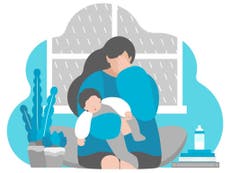How to make friends, and keep them
The last year has been one of the most lonely for so many people, Katherine Cusumano suggests ways we can make and keep friends, even during the pandemic

Your support helps us to tell the story
From reproductive rights to climate change to Big Tech, The Independent is on the ground when the story is developing. Whether it's investigating the financials of Elon Musk's pro-Trump PAC or producing our latest documentary, 'The A Word', which shines a light on the American women fighting for reproductive rights, we know how important it is to parse out the facts from the messaging.
At such a critical moment in US history, we need reporters on the ground. Your donation allows us to keep sending journalists to speak to both sides of the story.
The Independent is trusted by Americans across the entire political spectrum. And unlike many other quality news outlets, we choose not to lock Americans out of our reporting and analysis with paywalls. We believe quality journalism should be available to everyone, paid for by those who can afford it.
Your support makes all the difference.It took a pandemic, a layoff and last year’s racial justice protests to impel Margo Gabriel, a travel and food writer, to finally fulfil a long-held aspiration: to move to Lisbon, Portugal, from Boston.
“I was like, ‘OK, I really need to think about next steps,’” Gabriel, 34, says. “I’m getting older.”
She applied for, and was accepted to, a two-year master’s programme at the Universidade Católica Portuguesa. She arrived in October.
Forming new relationships in Lisbon was a priority, but she worried about making the connections she needed to thrive in her new home, especially during the pandemic.
“I’m an introvert by nature,” Gabriel says, “so I’m easily overwhelmed.” An editor she frequently works with recommended she reach out to another expat. They hit it off over coffee, finding solidarity in their shared identity as Black American women in Portugal. “We’ve been hanging out ever since,” she says.
The pandemic has profoundly disrupted some social circles: perhaps you’ve moved yourself, or maybe you’re looking up after a year of social distancing to find that your close friends are the ones who have relocated. And the guidance of public health officials to keep your distance, to mask up, to limit gatherings and to remain 2 meters apart? None of these are helpful for meeting new people and nurturing new friendships.
Nevertheless, Niobe Way, a professor of developmental psychology at New York University who has studied friendship for more than three decades, has anecdotally observed what she described as an “explosion of friendships” last summer, particularly in her own Manhattan neighbourhood – a display of optimism in the face of our oxymoronic collective isolation. It just takes a little more intention and a little more openness.
Here’s what experts and new pals have to say about making, and keeping, pandemic friends.
Get creative about meeting prospective friends
“It’s a difficult time to connect with new people,” says Marisa G Franco, a psychologist and friendship expert. “The first question you can ask yourself is: is there someone you want to reconnect with?” According to one study, rekindling “dormant ties”, or those you’ve lost touch with, is often easier than making new friends, because the individuals already trust one another. Look through your phone to see who you were texting this time last year, or reach out to a high school or college club you were affiliated with.
Lean on existing networks of friends and acquaintances, too. Though chance meetings in corridors or cafeterias may be infrequent these days, you can still turn casual connections, whether neighbours or work colleagues, into friends, or reach out to new people through shared acquaintances.
Part of making friends in adulthood — in general, but particularly in this moment — is trying to figure out how you fit into someone’s life
Or if that fails, join a virtual book club or a volunteer effort to connect with a stranger over a shared pastime. (It’s still possible!) Last year, Emily Beyda, a novelist, joined a roller-skating club with two other women in Los Angeles. It has since blossomed to around nine members who share techniques for new jumps, spins and tricks and linger after their practice has ended, just to talk.
And with no clubs for dancing or reasons to go out, the group’s members have taken to dressing up: “Everyone’s showing up at 1pm on a Sunday just looking gorgeous,” Beyda, 31, says. “Leopard-print bell bottoms, a gold lamé jumpsuit – dressed to the nines in the public park.”
Even if you feel as if your social muscles have atrophied, don’t brace yourself for rejection.
Approaching strangers in public places might not feel so welcome these days, but “in general, people underestimate how much strangers like them”, Franco says.
Stay connected
Writing letters, sending voice memos, scheduling phone or video dates – keeping in touch during the pandemic doesn’t have to be impersonal, even if it’s not in person. Not long after Catherine Smith, 34, moved to rural Abingdon, Virginia, from Philadelphia, she started trading favorite hiking routes and local tips with a new friend over Instagram. A quintessential social media meet-cute, with one pandemic-specific hitch: “We still haven’t gotten to meet in person,” Smith says.
Aminatou Sow, who hosts the podcast Call Your Girlfriend and wrote the book Big Friendship with Ann Friedman, suggests that friends try to avoid communicating over the same airwaves used for work. So if you video chat all the time for your job, don’t video chat your friends.
“We are two friends who love the Postal Service,” Sow says of herself and Friedman. Letter-writing can even be a way to meet new people across distances: in the spring, writer Rachel Syme started a pen pal exchange called Penpalooza that has since connected more than 7,000 participants.
However you choose to stay in touch, keep it consistent: send monthly postcards, tiny gifts or whatever baked good you’ve been perfecting recently, or get a weekly phone call on the books.
Talk frankly about your friendship
A year ago, frequent, granular discussions about how you handle exposure to disease weren’t especially common among even close pals. Now they’ve probably become hallmarks of your relationships. Having open, candid conversations can help buoy friendships along by establishing shared expectations and trust.
“Part of making friends in adulthood – in general, but particularly in this moment – is trying to figure out how you fit into someone’s life,” Friedman says.
Sow adds: “The stating of intentions is the first place to start. In this pandemic moment, I think that is also really important to remember because so many people feel lonely and so many people feel overwhelmed and so many people feel scared.”
This means setting aside time to have conversations about how much friendship you’re looking for – whether a mere running buddy or a BFF – while still allowing for the relationship to evolve. Talking about the Covid-19-related precautions you’re each taking can also make any in-person meetups more comfortable.
Developing a new friendship is not dissimilar to entering a romantic relationship, and initial meetups with a new friend can feel ‘sort of like a first date’
“I tend to over-communicate, especially now,” says Amanda Zeilinger. In July, Zeilinger, 23, moved in Minnesota to St Paul from Northfield to start a new job at a mosaic workshop in the Twin Cities. She had anticipated it might be harder to make friends in a new city amid shutdowns, but that hasn’t been the case: recently she formed a pod with two colleagues so they could foster their friendship outside work.
“I think people are so starved for human connection that we’re that much more open,” she says.
Go on a date – or two or three
“One of the defining features of our friends is that they’re exclusive,” Franco says. That means you have shared memories and experiences. So if you met through work or school or a club, plan a one-on-one virtual teatime or socially distanced walk.
“Repotting” friendships, or moving them from one setting to another – a term digital strategist Ryan Hubbard uses – can also help them gain momentum.
Developing a new friendship is not dissimilar to entering a romantic relationship, and initial meetups with a new friend can feel “sort of like a first date”, says Jordan Bennett, 31, a communications professional who lives in New York City. “You have the same nerves.”
Several of Bennett’s close friends left New York last summer; this, combined with a natural tendency to be “very, very social”, led him to start exchanging messages with a new friend through Bumble BFF. They met for the first time in September, and though it was platonic, Bennett says, he was also unsure how this prospective friend might react upon learning he is gay.
“You don’t know if someone is an ally, or how comfortable they are,” he says. The subject emerged organically, producing a comfortable conversation about relationships; they’ve since ventured out to bars and the gym and watched the vice presidential debate together.
After a successful initial get together, make plans to continue meeting up regularly. Several experts agreed that consistency strengthens bonds.
“Ritual is really important when it comes to connection, especially friendship,” says Adam Smiley Poswolsky, the author of the forthcoming book Friendship in the Age of Loneliness. Attaching friendship to a shared goal – a regular yoga practice, keeping up with a TV show – can reinforce the relationship and your new habit.
“Being intentional, being available, being reliable and being excited are all things that work in your favour,” Sow says.
© The New York Times




Join our commenting forum
Join thought-provoking conversations, follow other Independent readers and see their replies
Comments